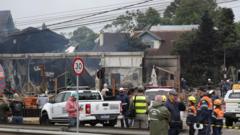The investigation of Israeli Prime Minister Benjamin Netanyahu’s Chief of Staff Tzachi Braverman, over allegations of document alteration related to the October 7 Hamas attack, raises critical questions regarding accountability and transparency in leadership amid ongoing political unrest.
Investigation of Netanyahu Aide Sparks Controversy Over Document Alteration

Investigation of Netanyahu Aide Sparks Controversy Over Document Alteration
Allegations against Tzachi Braverman highlight tensions surrounding Israel's handling of the 7 October Hamas attack.
The Chief of Staff to Israeli Prime Minister Benjamin Netanyahu, Tzachi Braverman, is facing scrutiny from law enforcement regarding allegations of document alteration tied to the Hamas attack on October 7, 2023. Reports indicate that Braverman was questioned for over five hours by the Lahav 433 major crimes unit, probing claims that he modified the documented timing of a crucial phone call in a manner that could cast Netanyahu in a more favorable light.
Central to the investigation is the timing of two significant calls received by Netanyahu as the Hamas cross-border raid took place. Braverman is accused of altering the recorded time of an initial call from Major General Avi Gil, Netanyahu’s military secretary, changing it from 06:40 to 06:29. During his interrogation, Braverman reportedly defended his actions, asserting, "I know that the first call was received at 06:29, that’s why I insisted on changing it."
Records indicate that while Gil did call Netanyahu at 06:29, Netanyahu did not provide any directives at that moment, instead requesting another call in ten minutes. It was only during the second call—allegedly altered by Braverman—that Netanyahu supposedly directed Gil to convene a situational assessment of the unfolding attack. This suggested manipulation of timestamps aims to project an image of promptness and decisive leadership at a time of national crisis.
This incident arises against the backdrop of Israel’s most significant military and intelligence failure in history, prompting the resignation of several senior military figures. Netanyahu, while firmly denying personal responsibility for the tragic event, faces fierce criticism from the opposition who argue that he bears ultimate accountability for the attack, which is recognized as the deadliest since the establishment of the State of Israel in 1948.
Simultaneously, various investigations are assessing systemic military and intelligence shortcomings, with accusations of Netanyahu stalling efforts for a thorough inquiry persistently surfacing. As this evolving controversy unfolds, it may have far-reaching implications for Netanyahu’s leadership, coinciding with his ongoing corruption trial scheduled to resume next month. Critics describe that trial as part of a broader political witch-hunt, further complicating his position in an already tumultuous political landscape.























